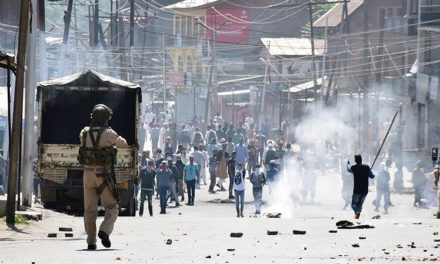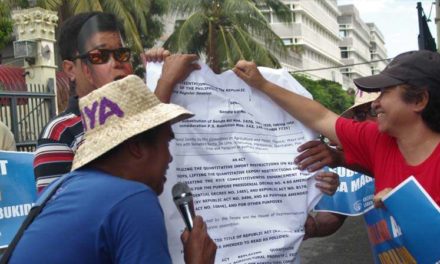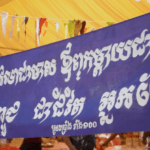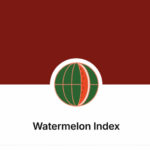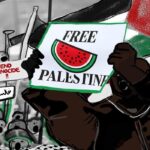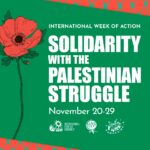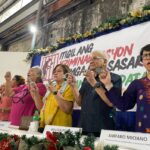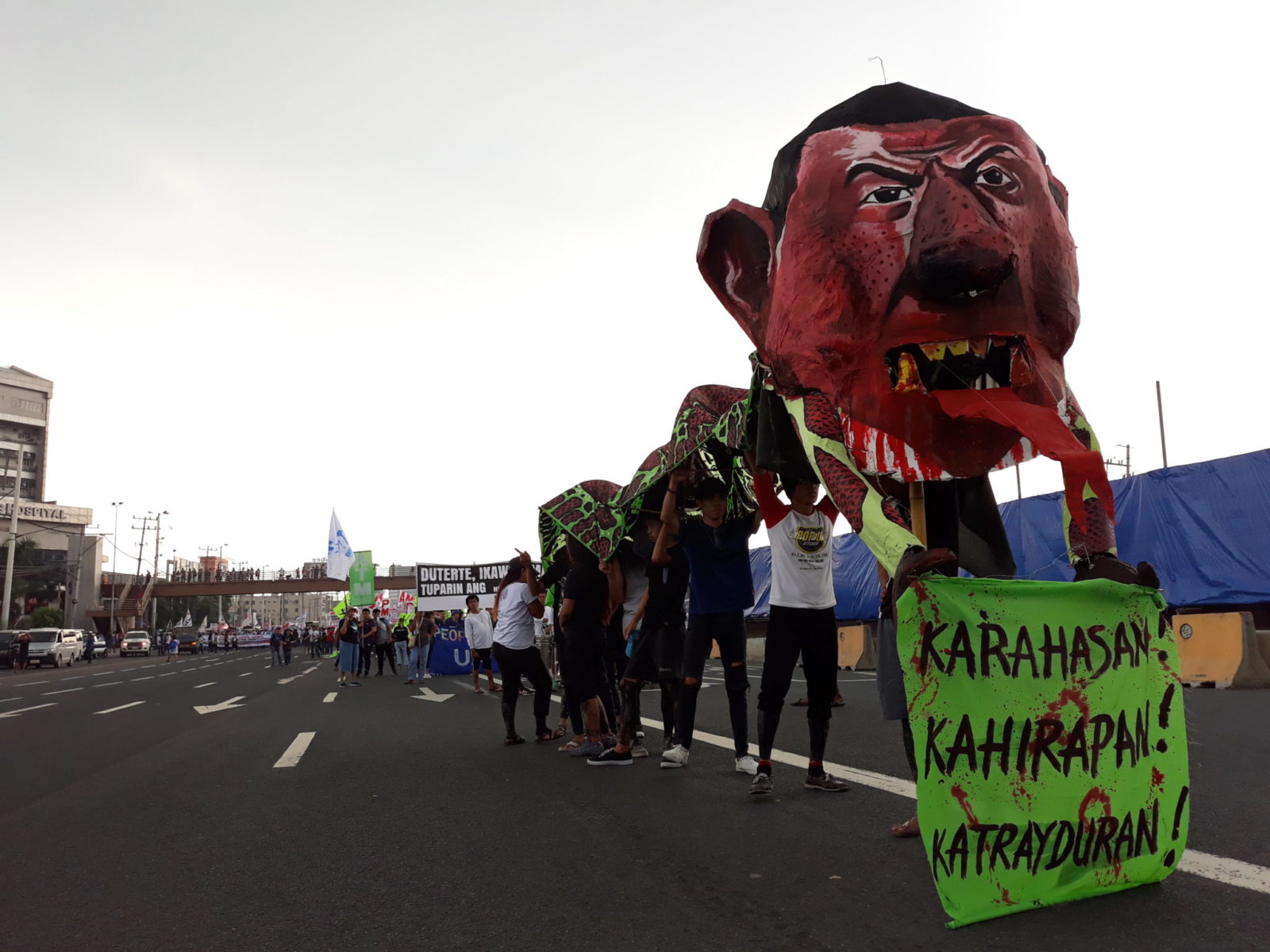
DUTERTE, THE SERPENT. His strongman rule ultimately serves the administration’s authoritarian and neoliberal agenda. United Peoples’ SONA. Quezon City, Philippines. 2019 July 22. Photo by Galileo de Guzman Castillo.
Focus on the Global South’s Statement on President Rodrigo Duterte’s midterm State of the Nation Address (SONA)
The landslide victory of the pro-administration slate Hugpong ng Pagbabago in the 2019 Midterm Elections, coupled with his consistently high popularity ratings reflected, according to Duterte, the masses’ unwavering faith in him. He underscored at the start of his SONA his mandate to “pursue relentlessly” the policies and programs of his administration. Yet despite the confidence, Duterte pointed to bigger obstacles that are derailing his efforts tobring about change. He repeatedly and strongly condemned the rampant and systemic corruption in government even referring to it as the root cause of the drug problem, extreme poverty, and the lack of foreign and local investments in the country. But while he stressed the failures of the bureaucracy, Duterte also commended the purported achievements of his strongman leadership and of the military men he appointed to his Cabinet. As opposed to traditional bureaucrats, these military men, according to Duterte, managed to deliver swift results and are insulated from corruption.
This overarching framework guiding Duterte’s SONA betrays his underlying narrative: There is a need to expand the powers of the strongman so that he may effectively address corruption and all the other problems born out of it. Yet a critical analysis of Duterte’s strongman rule has revealed that while it seems to deliver immediate results that appease the public’s immediate demands, it ultimately serves the administration’s authoritarian and neoliberal agenda in the long term. Over the last three years, this style of governance and the policies that came along with it have in fact sowed violence (karahasan), sustained poverty and high inequality (kahirapan), betrayed public trust and the national interest (katrayduran), and reinforced the patriarchal culture and bastardized democratic institutions (kabastusan).
Karahasan (Violence)
Duterte’s unrelenting ‘war on drugs’ has had deadly consequences. The latest death toll released by the Philippine Drug Enforcement Agency (PDEA) reported 5,375 deaths from anti-drug operations conducted by the Philippine National Police[1], a figure lower than what was previously reported. This figure also does not include the over 27 thousand classified by the authorities as ‘deaths/homicides under investigation’. Among the victims include 3-year old Myka Ulpina and over 100 other children, collateral damage from the violent anti-drug campaign.
The killings have also now extended to human rights defenders. From 2017 to 2018, close to 100 deaths of human rights defenders have been reported.[2] Sadly the number continues to rise. In June this year, labor leader Dennis Sequeña of Partido Manggagawa was shot dead in broad daylight in Cavite by unidentified gunmen. These murders are happening in the context of increasing criminalization of dissent and threats against human rights defenders.
Duterte’s violent rhetoric, exhorting and inciting the police and even ordinary citizens to “kill drug addicts” has emboldened perpetrators to murder with impunity, fomenting an environment of violence and fear.
iDEFEND points to deeper consequences: “[W]idespread impunity is breaking the social fabric of Philippine society, shrinking civic spaces for dialogue and engagement, corroding the rule of law, while impressing on neighbouring states who wish to emulate the violent campaign.”[3]
Kahirapan (Hardships)
Duterte continues to ride on his populist promises and purported accomplishments while discounting calls for critical policy reforms that confront the perennial issues of marginalized sectors. As Duterte boasts of a steady growth in the Philippine economy as well as declining poverty incidence, the past year was nevertheless marked by the passage of anti-poor policies that ultimately cater to corporate interests and the country’s elite.
The Rice Tariffication Law, designed by Duterte’s economic managers to lower rice prices for consumers, has instead enabled the expansion of corporate profiteering in the rice industry through unbridled importation. The influx of cheap rice imports in the last six months has already threatened the survival of small farmers as farm gate prices continue to slide in several provinces. The push to intensify agriculture programs supposedly to increase rural productivity and incomes, such as the Rice Competitiveness Enhancement Fund, will most likely favor agribusinesses and corporate profiteering from agriculture modernization.
The National Land Use Act remains in limbo. Against the backdrop of the country’s dwindling agricultural, and forest lands threatened by massive land-conversions, Duterte reiterates the need to pass the said policy, to meet the “demands of investors” and for the expansion of corporate investments in the countryside.
The impact of rising inflation have been continuously exacerbated by the Tax Reform and Acceleration for Inclusion, or the TRAIN Law. While Duterte’s economic managers defend the implementation of the TRAIN to sustain programs for health, education and infrastructure, additional taxes on basic commodities have increased the burden on the poor. On the other hand, Duterte urged the passage of the TRABAHO Law (TRAIN 2) to implement significant tax incentives for corporations.
The promise to end labor contractualization has failed miserably. His silence on labor issues during the SONA, and his veto of an already watered-down Security of Tenure (SOT) Bill four days later effectively ends the charade over safeguarding the welfare of workers. Despite Duterte’s strongman approach to governance, he remains unable and unwilling to stand up against the interest of business groups.
The same goes with his pronouncements for the passage of the Coconut Trust Fund Bill which he also vetoed earlier this year. With technicalities lodged by Marcos cronies to hamper the actual disbursement of the 75 billion-peso fund to farmers, Duterte says that the said bill cannot be passed without the money, which he has “yet to look for”. The distribution of the Coco Levy is another election promise that remains unfulfilled.
Halfway through his presidency, Duterte’s agenda for the poor remains schizophrenic and riddled with contradictions; favoring populist yet palliative solutions rather than instituting reforms that respond to the actual needs and demands of marginalized sectors. More than eradicating poverty, Duterte has laid the foundation for its persistence in the long-term by advancing elite agenda.
Katrayduran (Betrayals)
In Duterte’s inaugural speech three years ago, he mentioned the erosion of faith and trust in government as the real problem confronting the Filipino people. Midway into his term, the Chief Executive himself has become the very monster he had described and the problem he had promised to address.
Betrayal of public trust is one of the impeachable offenses outlined in the Constitution. It includes among others “inexcusable negligence of duty, tyrannical abuse of power, breach of official duty by malfeasance or misfeasance, cronyism, and favoritism to the prejudice of public interest and which tend to bring the office into dispute.”[4] Duterte has not only betrayed the Filipino people, he has also trashed the highest law of the land he has sworn to preserve and defend. He has disrespected and belittled the Constitution—under which he was elected into power— likening it to “toilet paper”, amidst criticisms on the administration’s weak assertion of the country’s sovereign rights.
The past three years saw a President beholden and subservient to foreign interests while abandoning the paramount principles] stated in the Constitution: national sovereignty, territorial integrity, national interest, and the right to self-determination. The past three years saw a President, arrogantly representing himself as the “Chief Architect of Foreign Policy” as if that is his exclusive concern. Everyone else—the Panatag fisherfolk, the Recto 22, the Dumagat-Remontado, the Maranao, the Lumad, the Filipino people—is left to cope with the consequences of his in/actions.
Furthermore, the Duterte administration betrayed not only the Filipino people but also the international community by fanning the flames of ultranationalism and stoking xenophobia. Most damning of all is the Duterte administration’s continuing presentation of a false dichotomy on the West Philippine Sea issue that any action other than kowtowing to China would lead to war.
Ironically, it has been Duterte’s War on Drugs—which is nothing but a War on the Poor—that led to thousands of people killed, thousands of children orphaned, and thousands of families destroyed.
Kabastusan (Perversions)
With his machismo being inflamed by the applause and laughter from the audience, Duterte had once again laced his speech with remarks that sexually objectified and commodified women. While praising what he claimed to be the successful rehabilitation of Boracay, he conjured up the image of foreign women sunbathing on the beach as an enticement for men to visit the reopened tourist spot. On that note, he commended Environment Secretary Roy Cimatu for “mixing his pleasure with work” by ogling at foreign women in bathing suits while overseeing the rehabilitation of the world-famous tourist island. With regard to the recent water crisis, Duterte recounted that the fiasco discouraged him from meeting his girlfriend back in Manila as the shortage might have left her unable to bathe which, according to him, would have caused much dismay.
Aside from these, he made no other statement relating to women in the entirety of his 93-minute speech. In other words, women were once again reduced to mere objects of Duterte’s sexist and misogynistic sense of entertainment in a highly important and widely broadcast address that sets the direction of his administration in the next three years. The very substance of these remarks sends the same threatening message that Duterte has repeatedly conveyed in the past: That women are only made to please men and that men are thus entitled to do whatever they please with women. More specifically, Duterte’s depiction of women’s bodies as enticement for tourism alarmingly normalizes and even encourages sex tourism—an illegal industry that has commodified women’s bodies, worsened gender-based violence, demoralized generations of women, and further multiplied the burden of earning a living and performing care work and housework on prostituted women for children who are are abandoned by sex tourists that get them pregnant. Duterte’s remarks thereby reinforce the same patriarchal and capitalistic values and institutions that have oppressed women and served as a major setback in the realization of their rights.
In much the same way that he has demeaned women’s rights, Duterte has also bastardized democratic institutions—all in the name of consolidating authoritarian rule. At the onset of his presidency, he justified the systematic killing of drug users and pushers and thereby undermined due process by depicting them as unthinking and uncontrollable perpetrators of heinous crimes who can no longer be rehabilitated and threaten peace and security. Those who condemned the massive human rights violations involved in the administration’s anti-drug operations have been misleadingly branded as criminal defenders, thus leading to the devaluation and eventual demonization of human rights. In the same vein, Duterte also provided justification for silencing the opposition and thereby undermined the system of checks and balances by disseminating a divisive political narrative that associates all his critics either with the traditional elites or the “dilawan” (yellows)—who have failed to address the country’s major problems despite being in power for 30 years—or the communists, who have often been portrayed as threats to peace and security. In effect, Duterte’s portrayal of democratic institutions and human rights as obstructions to his brand of radical and immediate change has ultimately led to the creation of a popular myth on the country’s need for a strongman ruler.
Conclusion
Duterte alluded to a quote from Winston Churchill towards the end of his SONA. The full quote reads: “The era of procrastination, of half-measures, of soothing and baffling expedients, of delays, is coming to its close. In its place we are entering a period of consequences.”
We have already seen and experienced over the last three years the dire consequences of the Duterte presidency. Just halfway to his term, he has already ushered an era of violence, hardships, betrayals, and perversions that continues to weigh down on us as a nation.
The deteriorating human rights situation, the extra judicial killings, the assault on human rights defenders, the anti-poor policies, the ever shrinking space for civil society, the betrayal of public trust, and misogyny—these reflect the true state of the Philippines under Duterte.
As if these are not enough, Duterte is promising to continue the momentum with greater fervor in the next three years and beyond. With strong support from his base and wielding greater control and influence over Congress, Duterte will continue to use the strong-arm of the Presidency to advance his political and economic agenda.
As we enter what Walden Bello referred to as the “brave new world of charismatic politics” or politics of faith, it is important for progressives to be unrelenting in the struggle for human rights, human dignity, democracy, and sovereignty.
We should continue to work together to inform and enlighten one another, to stand in solidarity with peoples and communities struggling for the recognition, protection, and fulfillment of rights towards a life of dignity. We should continue to organize and build unities among various movements at home, and work towards fostering greater international solidarity to push back authoritarian rule in the Philippines and elsewhere.
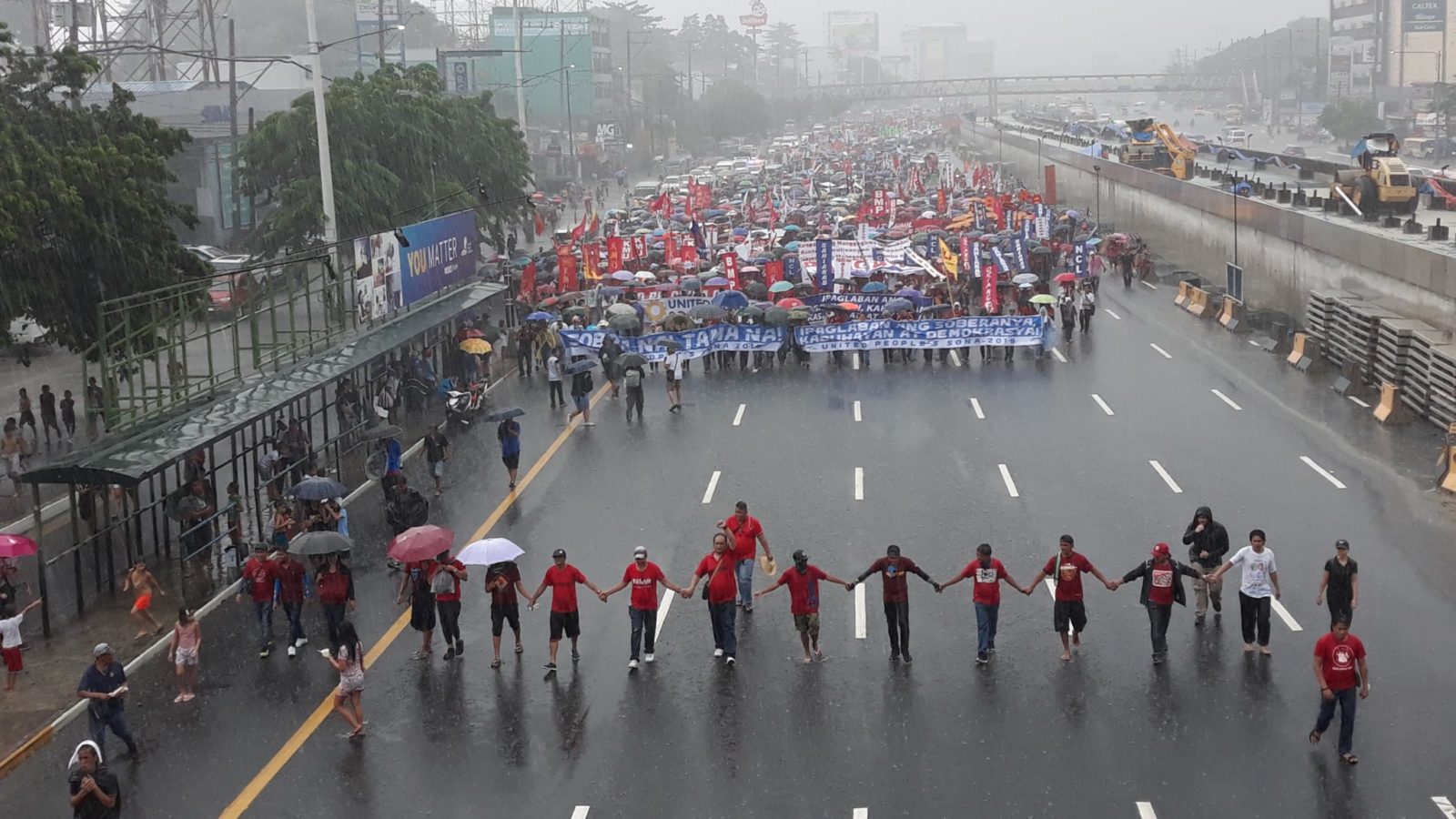
UNITY IN DIVERSITY. As we enter the brave new world of charismatic politics, unity without uniformity and diversity without fragmentation is imperative. United Peoples’ SONA. Quezon City, Philippines. 2019 July 22.. Photo by Galileo de Guzman Castillo.
Notes:
[1] See: http://pdea.gov.ph/pdea-map/2-uncategorised/279-realnumbersph
[2] Global Witness reported 48 deaths, while Frontline Defenders reported 60 deaths in 2017. Frontline Defenders reported 39 deaths of human rights defenders in 2018.
[3] Statement of the In Defense of Human Rights and Dignity Movement (IDEFEND) on the United Nations Human Rights Resolution https://idefend.ph/news/statements/human-rights-group-welcomes-iceland-resolution-on-the-philippines
[4] as expounded during the Constitutional Commission proceedings and debates in 1986


